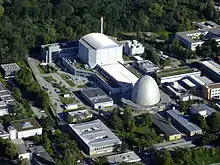TUM Department of Physics
The TUM Department of Physics (TUM PH) is a department of the Technical University of Munich, located at its Garching campus.
 | |
| Type | Public |
|---|---|
| Established | 1868 1965 (current organization) |
| Dean | Johannes Barth |
Academic staff | 48 professors (2020)[1] |
| Students | 1,993 (2020)[2] |
| Location | , , |
| Affiliations | TUM |
| Website | ph.tum.de |
 | |
History

Physics was one the founding disciplines of the Polytechnische Schule München in 1868, with the establishment of the Physikalisches Cabinet, later called the Physikalisches Institut. In 1902, the Laboratorium für Technische Physik (technical physics) was founded, spearheaded by Carl von Linde. In 1943, another institute, the Institut für Theoretische Physik (theoretical physics) was founded. In 1965, the three physics institutes were finally combined into the Department of Physics, as it exists today.[1]
The TUM Department of Physics is notable for its operation of research reactors on the Garching campus, the Forschungsreaktor München from 1957 to 2000 and the newer Forschungsreaktor München II since 2004.
Research groups
The main research areas the TUM Department of Physics are biophysics, nuclei, particles, astrophysics, and condensed matter. The following research groups currently exist:[3]
- Applied Quantum Field Theory
- Biomedical Physics
- Biomolecular Nano-Technology
- Cellular Biophysics
- Chemical Physics Beyond Equilibrium
- Collective Quantum Dynamics
- Dark Matter
- Dense and Strange Hadronic Matter
- Experimental Astro-Particle Physics
- Experimental Physics of Functional Spin Systems
- Experimental Physics with Cosmic Particles
- Experimental Semiconductor Physics
- Functional Materials
- Fundamental Particle Physics at Low Energies
- Hadronic Structure and Fundamental Symmetries
- Laser and X-Ray Physics
- Many Particle Phenomena
- Molecular Biophysics
- Molecular Dynamics
- Molecular Engineering at Functional Interfaces
- Nanotechnology and Nanomaterials
- Neutron Scattering
- Nuclear Astrophysics
- Observational Cosmology
- Physics of Biomedical Imaging
- Physics of Energy Conversion and Storage
- Physics of Surfaces and Interfaces
- Physics of Synthetic Biological Systems
- Plasma Surface and Divertor Physics
- Precision Measurements at Extreme Conditions
- Quantum Matter
- Quantum Technologies
- Semiconductor Nanostructures and Quantum Systems
- Soft Matter Physics
- Structure and Dynamics of Molecular Machines
- Technical Physics
- Theoretical Biophysics of Neuronal Information Processing
- Theoretical Elementary Particle Physics
- Theoretical Particle Physics at Colliders
- Theoretical Particle and Nuclear Physics
- Theoretical Physics of the Early Universe
- Theoretical Solid-State Physics
- Theory of Biological Networks
- Theory of Complex Bio-Systems
- Theory of Functional Energy Materials
- Theory of Quantum Matter and Nanophysics
- Topology of Correlated Systems
Rankings
| University rankings | |||||||||||||
|---|---|---|---|---|---|---|---|---|---|---|---|---|---|
| By subject – Global & National | |||||||||||||
| |||||||||||||
| CHE Ranking 2020 – National | |||||||||||||
| |||||||||||||
The QS World University Rankings ranks the Department 1st in Germany and 17th in the world.[4] The Academic Ranking of World Universities ranks the TUM Department of Physics as No. 8–9 in Germany and No. 101–150 in the World.[5]
The Times Higher Education World University Rankings does not rank individual subjects, though in the physical sciences TUM is generally ranked 25th globally and 2nd nationally.[6]
Notable people
5 laureates of the Nobel Prize in Physics have studied, taught or researched at the TUM Department of Physics:
- 1961 – Rudolf L. Mößbauer (Mößbauer effect)
- 1985 – Klaus von Klitzing (quantum Hall effect)
- 1986 – Ernst Ruska (electron microscope)
- 1989 – Wolfgang Paul (ion trap)
- 2001 – Wolfgang Ketterle (Bose-Einstein condensation in dilute gases of alkali atoms)
The Gottfried Wilhelm Leibniz Prize has been awarded to Gerhard Abstreiter, Martin Beneke, Franz Pfeiffer and Hendrik Dietz.[1]
References
- "About Us - The Physics Department of the TU Munich". TUM Department of Physics. Retrieved 23 December 2020.
- "TUM Facts & figures". Technische Universität München. Retrieved 22 December 2020.
- "Research". TUM Department of Physics. Retrieved 23 December 2020.
- "QS World University Rankings by Subject 2020: Physics & Astronomy". QS World University Rankings. Retrieved 22 December 2020.
- "ShanghaiRanking's Global Ranking of Academic Subjects 2020 - Physics". Academic Ranking of World Universities. Retrieved 22 December 2020.
- "World University Rankings". Times Higher Education World University Rankings. 2 September 2020.
- "QS World University Rankings by Subject 2020: Engineering - Materials Science". QS World University Rankings. Retrieved 31 December 2020.
- "Studying Physics in Germany". CHE University Ranking. Retrieved 31 December 2020.